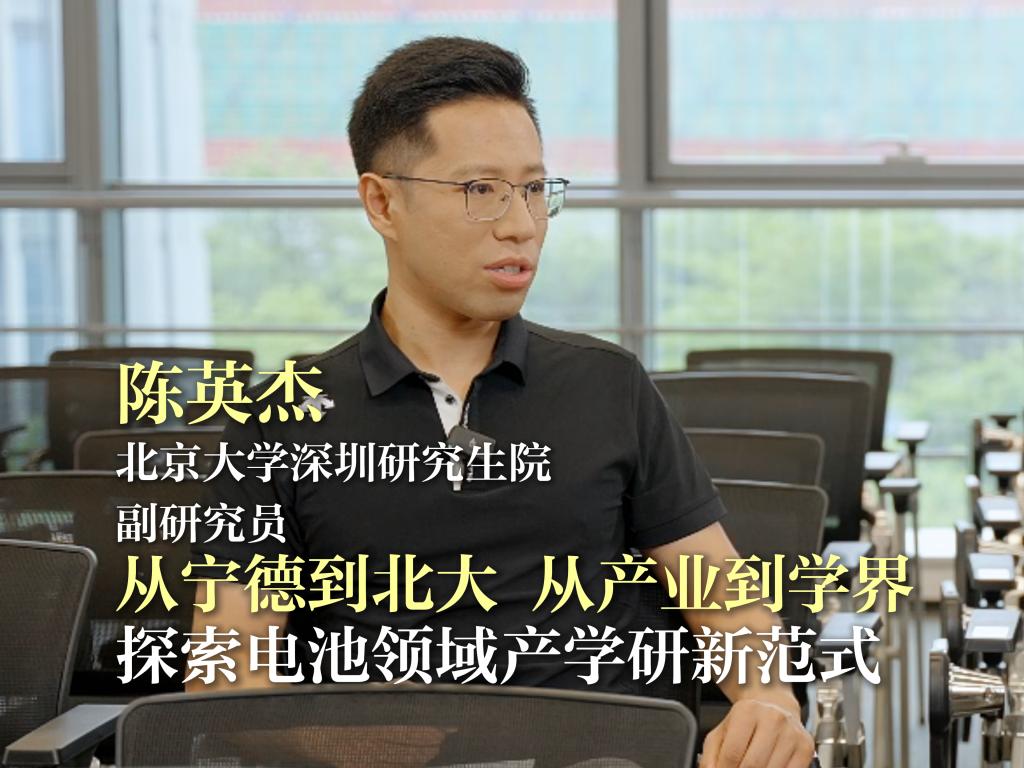Yingjie Chen, Associate Researcher at Peking University Shenzhen Graduate School, former senior practitioner in the new energy industry, and head of the Algorithm Department at Contemporary Amperex Technology Co. Limited (CATL)/Ampacetech.

I. Breaking Through: A Cross-Boundary Journey from Tsinghua to Ningde to Peking University
How does one keep pushing forward by stepping out of their comfort zone? Professor Yingjie Chen answers this question with his remarkable career choices. As a top 5% student in Tsinghua University’s Department of Automation, he boldly turned down lucrative offers from the internet industry, choosing instead the then-emerging field of new energy because of his passion for engaging with the “real physical world.”
In the five years following his Ph.D., he turned the “impossible” into reality. He led the development of battery management system (BMS) algorithms, guiding his team to achieve industry-leading technical benchmarks. His work enabled the mass production and delivery of nearly 10 million BMS units, generating hundreds of millions of yuan in commercial value for his company and setting a record for the fastest promotions and salary increases within the group.
Yet, at the peak of his corporate career, Yingjie Chen made a daring pivot, returning to academia to focus on next-generation technology research. “In industry, you chase trends; in academia, you create them,” he declared with conviction, reflecting his deep understanding of the essence of research. Despite uncertainties and a 6-million-yuan annual salary offer from industry, he chose to pursue a “from 0 to 1” breakthrough through original innovation.
II. Anchoring Battery Management: Striving for the Best Battery Algorithms
In Professor Chen’s research vision, battery management is an art that integrates safety, economics, and user experience.
He developed an active safety system that improves system safety by 1–2 orders of magnitude, optimizes management to reduce costs by 20%, and enhances return on investment. His refined control algorithms eliminate common issues like unexpected power interruptions, significantly improving user experience.
How can such stringent quality requirements be met while achieving stable mass production and delivery of nearly 10 million units across diverse applications? Professor Chen believes that establishing a robust R&D “philosophy” is key. Quality must be proactively managed during the development phase to prevent issues, rather than addressing them reactively after market deployment. Problems exposed later in the process incur exponentially higher costs.
Looking to the future, he predicts that enabling batteries to “speak for themselves” will be a technological breakthrough. Through an innovative system combining “digital twins and material genomics,” batteries can undergo full lifecycle simulations in a virtual environment. For instance, AI can now generate superior models, empowering various stages of the battery industry, including production, R&D, operations, and after-sales services.
Speaking of China’s position in the global new energy industry, Professor Chen takes pride in having witnessed and contributed to its rise. A decade ago, Tesla was the industry benchmark; today, China’s new energy industry has surpassed it, maintaining a leading global position.
III. A Technologist’s Vision: The Zero-Carbon Mission and a Universe of Possibilities
In Professor Chen’s technological blueprint, the energy revolution is expanding beyond ground transportation and energy storage to new domains such as aircraft, ships, robots, and data centers. With keen foresight, he anticipates that new energy applications will see even broader scenarios in the next five years.
However, he emphasizes the need to return to first principles and fundamentally reimagine energy system architectures. “Our imagination and expectations for technology can be even bolder—there’s still so much to do.”
Back in academia, Professor Chen outlines his ideal research paradigm: generating original academic breakthroughs, translating them into industrial advancements and commercial value, and reinvesting part of that value into further research. His journey from academia to industry and back again embodies this cycle. He believes the future lies in these grounded, actionable steps.
“Zero-carbon is not just a slogan; it’s the vast frontier of next-generation battery technology research and application.” On the innovative soil of Shenzhen, Professor Chen is a “trendsetter,” actively contributing to an energy revolution that shapes the future of humanity.
Professor Chen is the principal investigator of the project “Battery Management Technology Research” at the SAM, Peking University Shenzhen Graduate School. The project aims to support research and development in the field of battery management, fostering the advancement of teaching, scientific research, and student training within the university.
